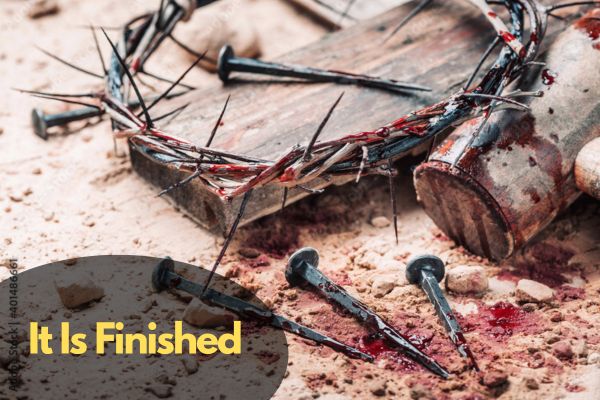Table of Contents Show
Every year, on Good Friday, churches preach Jesus’ final seven sayings on the cross. Some churches have seven separate speakers, with each person covering one saying. Sometimes you don’t have to say much to convey a lot. This is one of those instances where so much is packed into three words.
It Is Finished
One of the final things Jesus uttered on the crucifixion was, “It is finished.” Why did Jesus declare, “It is finished”? What does this mean for you and me? ” is a phrase with significant meaning in a variety of situations, including historical and religious. It has been stated by important personalities and conveys a sense of finality, accomplishment, or conclusion.
Where in the Bible does Jesus say “It is finished”?
The four gospels contain four accounts of Jesus’ death. To find the seven things Jesus said on the cross, read all of the gospel stories. In the gospel of John, Jesus says, “It is finished.”
“After receiving the wine, Jesus declared, “It is completed.” He bent his head and surrendered his spirit.” (John 19:30)
Tetelestai is the Greek word for “it is finished”.
What happened before Jesus said it was finished?
As we study the various versions of Jesus’ crucifixion, we learn that Jesus shouted out in a loud voice just before dying. If we integrate the evidence from the four gospels, I believe we may determine with fair certainty what Jesus said before he died. According to the gospels, “it is finished” was most likely his next-to-last words. According to the accounts of the crucifixion in Matthew, Mark, and John, Jesus was offered a sponge soaked in wine vinegar to drink.
John’s gospel tells us that Jesus said, “I am thirsty.” After being offered this wine, Matthew and Mark tell us that Jesus cried out again in a loud voice (Matthew 28:50; Mark 15:37), he gave up his spirit. According to John’s account, Jesus merely remarked, “It is finished,” and there is no mention of him crying out loudly. Luke quotes what he says in a loud voice: “Father, into your hands I commit my spirit” (Luke 23:46).
Why did Jesus say it was finished if the resurrection hadn’t yet occurred?
The phrase “it is finished” appears exclusively in John’s Gospel. So, why did Jesus say that “it is finished”? After all, wasn’t there more to do, such as the resurrection? When Jesus spoke these words, he could do so with confidence since three things had been completed by his death on the cross.
1. The prophecies of Scripture were completed.
“Later, knowing that everything had now been finished, and so that Scripture would be fulfilled, Jesus said, “I am thirsty.” A jug of wine vinegar was nearby, so they soaked a sponge in it, placed it on a stalk of the hyssop plant, and lifted it to Jesus’ lips. When Jesus received the drink, he exclaimed, “It is finished.” He bent his head and surrendered his spirit.” (John 19:28-30) Jesus’ life and death fulfilled numerous predictions found throughout the Old Testament.
Even when Jesus was in anguish and near death, he recalled every prophecy and ensured that they were fulfilled. When he was convinced that all of the predictions had been fulfilled, he completed that element of his task.
2. The judgment for sin was accomplished.
Another task completed on the cross was the judgment and punishment of sins required for our salvation. When Adam and Eve sinned in the Garden of Eden, God wrapped them with animal skin clothing (Gen. 3:21). The last time I looked, removing an animal’s skin required killing it. By doing so, God established the concept that something or someone had to die for sin to be covered or addressed. The death of the animal to conceal Adam and Eve’s guilt foreshadows the law’s requirement for sacrifices to cover the Israelites’ sins.
Ultimately, this indicated the sacrifice of Jesus on the cross to cover our sins and remove them. Because of our transgression, a price had to be paid to meet the judgment sin demanded. When Jesus was crucified, God placed the world’s sins on him, fulfilling the necessity for judgment. We are reminded of this in Isaiah 53:5-6, where we learn that all of our sins were put on Jesus, and he became the once and for all sacrifice required to meet the demands of God’s justice.
3. The shedding of blood provided pardon for sin.
“The law requires that nearly everything be cleansed with blood, and without the shedding of blood there is no forgiveness.” (Heb. 9:22)
By dying on the cross and shedding his blood, Jesus provided forgiveness for sin. Because the judgment of sin (death) and the payment of sin (blood) were both fulfilled, Jesus could announce, “It is finished.” You may question how this could be considered a done work if he still needed to be raised from the grave.
Jesus’ work on the cross paid the complete price for our redemption and offered a remedy for sin forgiveness, allowing him to conquer sin. That particular section of the work was completed, and the payment for our redemption was permanently satisfied. According to Hebrews 9:24-26, Christ not only shed his blood, but he only had to do so once, which was sufficient. His one sacrifice provides a route to forgiveness for all who want it. That’s why Jesus can announce, “It’s finished.” The work required for our salvation and forgiveness was completed.
Why Jesus’ Resurrection Proved It’s Finished
One last fact must be addressed, which connects all of this material. We must briefly discuss the resurrection. While the labour on the cross paid the complete payment, as Jesus stated, “it is finished,” the resurrection seals the bargain. When Jesus rose from the dead, he revealed that he was Lord of sin, death, and the grave.
His resurrection also demonstrated that Jesus was who he said he was. The resurrection gives us hope for eternal life. Because Christ lives, we shall also live. His resurrection lays the groundwork for us to believe in him; thus, it is a fundamental part of our faith and hope.
Because Jesus is a resurrected saviour, we can trust him with confidence, knowing that the cross has forgiven our sins and secured our eternal life. The task is finished. This signifies that our salvation, redemption, and eternal life have been completed and sealed in Christ eternally. This brings hope in Christ that is not limited to this life. If so, Paul suggested we should be pitied more than anybody else (1 Cor. 15:19). Because that is not the case, you can rejoice now because, no matter what happens in this life, you know the task is complete. As a result, your salvation is guaranteed for all eternity.
Conclusion
“It is finished” conveys a profound sense of completeness, accomplishment, and closure. Whether it is an influential figure’s final words, the conclusion of a significant event or effort, or a spiritual pronouncement, the phrase conveys a sense of finality and satisfaction.
Its impact and meaning vary depending on the context, but it ultimately conveys the concept of things coming to an end or reaching a point of completion. “It is finished” reminds us of life’s cycles, the significance of closure, and the possibility of fresh beginnings. It is a sentence that encourages reflection, introspection, and gratitude for the path that led to its utterance.








